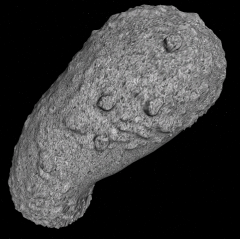Difference between revisions of "25143 Itokawa"
Jump to navigation
Jump to search
m (Arvil moved page User:Arvil/Sandbox01 to 25143 Itokawa: Move to article page.) |
(Added SolarSystem template, categories.) |
||
| Line 67: | Line 67: | ||
Animation of 25143 Itokawa orbit.gif|Animation of the orbit of 25143 Itokawa | Animation of 25143 Itokawa orbit.gif|Animation of the orbit of 25143 Itokawa | ||
</gallery> | </gallery> | ||
| + | |||
| + | {{SolarSystem}} | ||
| + | |||
| + | [[Category:Articles|Ikotawa]] | ||
| + | [[Category:Celestial bodies|Ikotawa]] | ||
| + | [[Category:Solar System|Ikotawa]] | ||
| + | [[Category:Near-Earth objects|Ikotawa]] | ||
Revision as of 18:16, 21 May 2024
|
Project home: 3D Asteroids |
25143 Itokawa is a Near-Earth object discovered in 1998 by LINEAR project and named for the Japanese rocket engineer Hideo Itokawa.
Gallery
| edit The Solar System | |
|---|---|
| Central star |
Sun (Sol) |
| Planets |
Mercury - Venus - Earth - Mars - Jupiter - Saturn - Uranus - Neptune |
| Natural satellites |
Moon - Phobos - Deimos - Io - Europa - Ganymede - Titan - more... |
| Add-ons |
Planets - Dwarf Planets - Small objects - Natural satellites - Alternative star systems |

